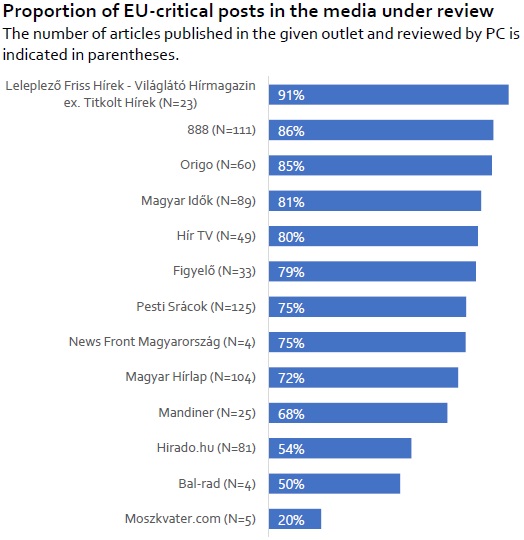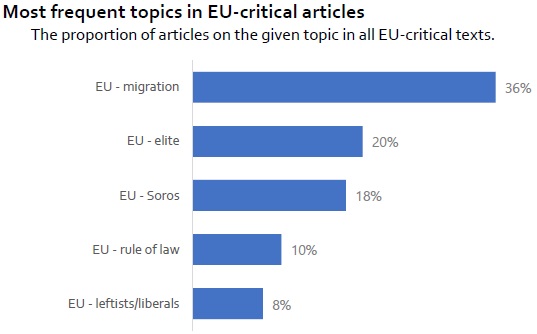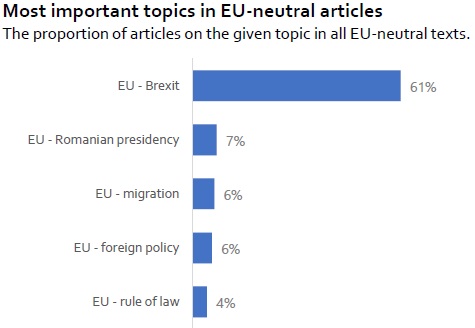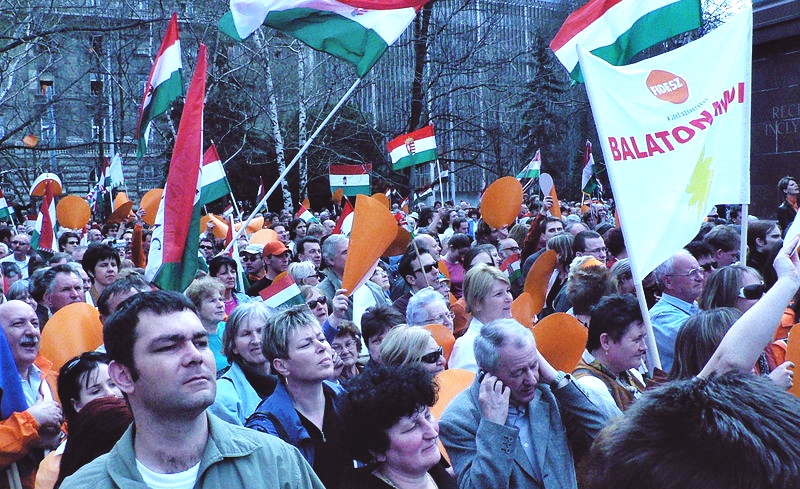713 articles shared on Facebook sites belonging to government-controlled media outlets (GCMOs) and pro-Kremlin outlets indicate that the governing party’s European Parliament (EP) campaign messages mainly attack the EU elite and the bloc’s institutional system through the dissemination of manipulative information concerning migration, epitomized by its recently launched campaign against George Soros and European Commission (EC) President Jean-Claude Juncker. Several European far-right parties and the Kremlin’s propaganda machine uses strategies similar to Fidesz.
The EP-debate on Hungary initiated by the Greens was one of the most important Hungarian domestic political issues in January 2019. Although the Orbán government sent no representatives to the discussion held on January 30, the initiative offered a perfect opportunity to Fidesz to swif its EP-campaign into high gear.
While the majority of Hungarians want to remain a member of the EU, they are highly critical of the EU’s answers to the migration crisis, largely due to the fact that the government’s propaganda has been misinterpreting them since 2015.
This is not unique in the EU, but Fidesz is a way more dominant actor on the Hungarian media market than other European governing parties are in their respective countries.
EU-Critical Tone
Political Capital used the social media management tool Zoomsphere to examine 713 articles shared on the Facebook pages of GCMOs and pro-Kremlin outlets between January 1 and 31, 20191. We tagged all articles with a label indicating its tone (EU-critical /-neutral) and with at least one indicating a wider topic it deals with. All articles received an EU-critical tag if:
-
their purpose was to negatively influence the population’s perception of the EU;
-
they did not introduce the opposing side’s viewpoints or they were disproportionately underrepresented;
-
they contained debunkable disinformation or unjustifiable claims.
In the media under examination, we found 540 EU-critical articles (76% of the total) and 173 ones that discussed the European Union neutrally (24% of all).
 Looking at the given outlets independently, we can see that the outlet reporting on EU issues in the least balanced manner was the pro-Kremlin Leleplező Friss Hírek, but the GCMOs Hír TV, Magyar Idők, and 888 all shared EU-critical articles in over 80% of the reviewed cases. The public broadcaster’s Facebook site was also EU-critical in over 50% of the time.
Looking at the given outlets independently, we can see that the outlet reporting on EU issues in the least balanced manner was the pro-Kremlin Leleplező Friss Hírek, but the GCMOs Hír TV, Magyar Idők, and 888 all shared EU-critical articles in over 80% of the reviewed cases. The public broadcaster’s Facebook site was also EU-critical in over 50% of the time.
 The main topic featured in articles painting a negative picture of the EU was migration, followed by content biasedly criticizing the EU elites and articles concerning George Soros. Texts about the rule of law procedures and leftists/liberals were two other highly prevalent topics in the period under review.
The main topic featured in articles painting a negative picture of the EU was migration, followed by content biasedly criticizing the EU elites and articles concerning George Soros. Texts about the rule of law procedures and leftists/liberals were two other highly prevalent topics in the period under review.
These topics are all connected to the main campaign message of the government’s EP-election campaign, which claims that in the election “the patriots go up against the Soros-controlled leftist-liberal elite organizing migration, who are trying to punish anti-immigration member states under the veil of alleged deficiencies in the rule of law”.
 The vast majority of neutral articles concern Brexit; other topics (the start of the Council’s Romanian presidency, migration statistics, EU foreign policy, and the rule of law) are almost unnoticeable in comparison. A few articles also discussed the EU infringement procedure launched against Austria for its amendments to its family benefit system and the result of the Union’s research on double standards in food quality in a balanced manner.
The vast majority of neutral articles concern Brexit; other topics (the start of the Council’s Romanian presidency, migration statistics, EU foreign policy, and the rule of law) are almost unnoticeable in comparison. A few articles also discussed the EU infringement procedure launched against Austria for its amendments to its family benefit system and the result of the Union’s research on double standards in food quality in a balanced manner.
The government likely either deems these topics unimportant from a domestic political perspective or they are in line with the government’s interests; thus, in these cases we can observe balanced reporting in GCMOs as well.
Nothing Too Complicated
Fidesz’s EP election campaign is built on a very easily understandable narrative that can be pieced together from the EU-critical articles shared by the outlets under review. The government believes that “the socialist Frans Timmermans’s migrant settlement plan must be stopped.” The EC’s first vice-president is labelled as the “main confidante of George Soros” and the “Spitzenkandidat of pro-immigrant forces.”
In Fidesz’s narrative, “Soros’s people in Brussels” are present in all institutions, where they are working on implementing the “migrant visa” and quotas, and legalize illegal immigration. In this world, George Soros operates like a “state,” which is essentially the EU, in the institutions of which they hold “Soros seances.”
This pro-immigration, leftist-liberal, Soros-friendly elite in fact “blackmails, threatens, punishes” countries that object to immigration using the rule of law procedures, threats of cuts to EU subsidies, and they would even “finance NGOs to find rule of law deficits [in these countries].”
The epitome of the Hungarian ruling party’s manipulative efforts is the recently launched public information campaign against George Soros and EC President Jean-Claude Juncker, which the European Commission quickly denounced as disinformation.
Fidesz is presenting a very simple view of the world to its electorate: the decisive dividing line on the European level lies not between traditional left-right party lines but between pro- and anti-immigration forces. This way, they suggest that there are only two choices when it comes to migration policy: the governing party’s solutions based solely on security policy related considerations and the “radical pro-immigration” policy taking only humanitarian factors into account. Thus, the Orbán government excludes any possibility of the existence of a policy solution factoring in both security policy and the humane treatment of refugees, making meaningful debate on the topic impossible.
Anyone who disagrees with Hungarian migration policies on even a single point is automatically put into the pro-immigration “mass” and thus gets categorized into the government’s black-and-white worldview.
The rhetorical transformation of the political spectrum necessitates the use of disinformation and propagandist news: if GCMOs publicized the views of the opposing side, who could then discuss their own, varied recommendations on migration, the myth of “one pro-immigration bloc” would disappear, and the electorate might realize that the EP-election campaign is focused on way more than one topic, which all affect the lives of European citizens.
Without spreading manipulative information, it would be hard to convince people that Frans Timmermans is the lead candidate of “pro-immigration” forces, who is constantly meeting members of the Soros-network.
In fact, Timmermans is only the lead candidate of the Party of European Socialists (PES), whose election to EC president would not even be guaranteed if the PES earned the most mandates in the EP elections, since the president is nominated for confirmation by member states.
Moreover, data from EU Integrity Watch shows that Timmermans met a lobbyist 260 times between December 2014 and February 2019, which is around the third of Commissioner Günther Oettinger’s 727 meetings.
Timmermans was primarily visited by NGOs, the reason for which is relatively simple: the commissioner is responsible for the EC’s rule of law related work and oversees the migration commissioner, which are policy fields mainly dealt with by civil society – meaning that the organizations the government labels as “Sorosists” are just lobbyists working legally and they do not even operate secretively. In contrast, no lobby law has been in force in Hungary since 2011, so in Budapest – unlike in Brussels – it is unknown who is trying to influence policy-making.
Although the NGOs can lobby for the European Commission to implement the quota system, the EC only has a mandate to propose legislation in the EU, the final decision is made by the Council (and the EP), where all member states are represented, including the V4. The EU is not punishing countries that are against the quotas: Slovakia and the Czech Republic voted down the temporary quota mechanism in 2015, while Finland abstained, and none of them are facing rule of law procedures.
Another country not facing disciplinary action in the EU for rule of law deficiencies is Austria, whose incumbent conservative government pursues a hardliner migration policy. In fact, Fidesz rather hides behind its migration policy to cover up its autocratic state building efforts, and it is the latter that prompts the EC to act, not the government’s opposition to the quota system – in which it does not stand alone.
Fidesz Campaign Is Disadvantageous for Hungary
Fidesz’s strategy could be risky for multiple reasons. The oversimplification of the EP election campaign means that a considerable layer of Hungarian society will rarely hear about some topics. The government refuses to formulate an opinion on other issues that could interest Hungarians according to a special Eurobarometer published in November 2018: wages across the EU, expanding the use of renewable energy sources, and the level of harmonization in the EU in various policy fields.
Disinformation plays a key role in maintaining fears about migration: after it was revealed that the number of illegal crossings into the EU hit a five-year low in 2018, government-controlled media found 800,000 asylum-seekers potentially heading to Europe from Libya.
GCMOs generally highlight the effects of migration by making unjustifiable claims: the Swedish welfare state is cracking under the pressure of immigration, business circles are profiting from the “Islamisation” of Europe, and “potential terrorists” who are unwilling to accept the host country’s laws are coming to Europe.
In fact, only about 2-3 million immigrants have recently arrived to the EU, which has a population of 500 million, and the Swedish welfare state is doing fine, it is still ranked second in US News’s list of countries with the highest quality of living.
It is hard to deny that there are a few individuals posing a national security threat among the new arrivals, and intelligence services should deal with these risks, but it is surreal to suppose that every single person coming to Europe would be a potential terrorist or criminal, as GCMOs claim.
The biased criticism levied against the EU’s institutional system and its elite could decrease Hungarians’ trust in the EU and their optimism concerning its future, which could even strengthen pro-Huxit sentiments in the long-term.
While the Hungarian government has not declared that it seeks to leave the European Union (the currently valid 2012 Hungarian National Security Strategy actually claims Hungary’s EU membership is an essential interest of the country), strengthening support for leave movements is, in contrast, the desired outcome of the Kremlin’s propaganda. It is not a coincidence that Moscow’s anti-EU campaign is built on very similar foundations as the Hungarian cabinet’s: It does not necessarily encourage people to support the exit of their respective countries from the EU directly, it simply describes EU policy recommendations with the aid of manipulative information as harmful and detrimental to the interests of European nations, which can in certain cases be supplemented by open praise for policies in line with Russian interests (e.g., claiming that lifting the sanctions would have serious economic benefits).
The Hungarian government’s strategy and narrative could serve as an example, and more and more political actors could start defining themselves within the pro-/anti-immigration framework.
Moreover, the government’s campaign messages might find their way into the arguments of extremist parties outside of Hungary and disinformation portals connected to them, as well as into the official, semi-official pro-Russian portals and the ones managed by “useful idiots.” This could partly elevate the Orbán administration’s rhetoric to the European level – albeit in most EU member states only a small layer of the population can be reached by the disinformation press considering the fact that in other countries these outlets do not have such a large market share.
Fidesz and other extremist parties favor the “Europe of Nations” concept, which they even promote with the use of disinformation. This concept is built on unanimous decision-making, which would slow down legislative processes in the EU and make it harder to legislate in field that are of key importance for Hungary, such as the Single Market and the EU Common Commercial Policy.
Moreover, any increase in the number of policy fields where EU decisions are made unanimously gives more opportunities to hostile third countries to influence the EU’s policies through bilateral relations with member states – which is in line with the provisions of Russia’s Foreign Policy Concept approved in 2016.
A Way Out: Meaningful Debates on Other Issues Affecting European Lives
The forces supporting the development and a rational reform of the European Union should not restrict themselves to the playing field set by extremists. This, however, does not mean that they should not address migration at all.
The key interest of political forces placing themselves outside of the pro-/anti-migration framework is holding meaningful debates on a wide range of issues, policies affecting the Union’s future. It is useful to try to involve extremist actors in these debates, and depict their refusal to participate as an indication of their unpreparedness or lack of interest.
In Hungary, the EP-election campaign will be influenced to a large extent by whether the opposition will allow Fidesz to campaign in the frames set by the ruling party itself or they will be able to break out of these limits and offer their own narrative on the future of the EU.
The governing party will do everything in its power to hinder these efforts and continue forcing the opposition to adhere to its rules. One of the key tools to achieve this is – as we have seen – disinformation spread by pro-government media.
1 The media outlets under examination were: the GCMOs 888, Origo, the since then rebranded Magyar Idők (now Magyar Nemzet), Hír TV, Figyelő, Pesti Srácok, Magyar Hírlap, Mandíner and Hirado.hu; and the pro-Kremlin Friss Hírek (which publishes the articles of the alternative news portal Világ Figyelő), News Front Hungary (which can be connected to Russian secret services), Balrad.ru and Moszkvater.com.



